De Oostenrijkse schrijver Ludwig Anzengruber werd geboren op 29 november 1839 in Wenen. Zie ook alle tags voor Ludwig Anzengruber op dit blog.
Uit: Wie mit dem Herrgott umgegangen wird. Eine Geschichte mit einigen »Merks«
„Es ist eine arge Welt, einer macht’s dem andern und der liebe Gott allen zusammen nie recht. Es ist eine hübsche Sache um die Frömmigkeit, aber wenn einer um Sonnenschein und der andere auf dem nämlichen Fleck um Regen betet, da möcht’ ich wohl einen dritten zum Herrgott machen und zusehen, was der bei all seiner Allmacht anfinge, um es mit keinem von den beiden zu verderben.
Im Norden sind die Menschen etwas kühler und nehmen’s nicht gleich übel, wenn er sich etwas schwerhörig stellt, aber im Süden da sind sie heißblütig und werden sehr ungehalten: da ist es denn für dort eine ganz gute Einrichtung, daß man zwischen Gott und die aufdringlichen Beter die lieben Heiligen eingeschoben hat, die nun freilich für jede unerfüllte Bitte aufkommen müssen.
Wahrhaftig, so ein Heiliger ist nicht zu beneiden und ich möcht’ keiner werden; denn abgesehen davon, daß die Erreichung einer solchen hohen Stelle auf der Erde mit manchen Unannehmlichkeiten und Umständlichkeiten verknüpft ist, so muß ja einer im Himmel ganz höllisch aufpassen, daß er tagüber keine Anrufung vergißt, so daß ihm fast keine Zeit bleibt, sich der ewigen Seligkeit zu erfreuen, höchstens zur Nachtzeit, aber solche übernächtige Seligkeit verträgt sich wieder tags darauf spottschlecht mit den Berufsgeschäften, wie manche gar wohl wissen, die gerade keine Heiligen sind.
Ja, es ist eine hübsche Sache um die Frömmigkeit, wenn es nur nicht manche so weit versehen möchten, daß ihr Gebet einer Lästerung auf ein Haar gleicht. Da war einmal eine öffentliche Dirne, die hat einen jungen Menschen zu berücken gewußt, daß er eine Zeitlang zu ihr gehalten hat; nun sind ihm denn doch endlich die Augen aufgegangen und das war ein Glück für ihn, sonst wäre er ja ein verlorener Mensch gewesen, und er hat das Weibsbild verlassen. Aber die Allerweltsliebste war darüber gar sehr betrübt und was thut sie? In die Kirche geht sie und betet zur »allerreinsten Jungfrau Maria«, dieselbe möge ihr das Herz ihres Buhlen wieder zuwenden, damit die unsaubere Liebschaft ihren Fortgang haben könne. Wenn das nicht gelästert ist, dann weiß ich überhaupt nicht, was Beten heißt und sein soll.
Ueber das Stück lacht wohl keiner, dazu ist’s nicht angethan und steht nur da, damit man sieht, was manche für Anliegen vor die Heiligen bringen, denn es ist eine wahrhaftige Thatsache und nicht erfunden. Was aber den Heiligen in Welschland begegnen kann, das will auch erzählt werden und darüber könnten sie selber lachen, falls sie es im Himmel nicht verlernt haben.“
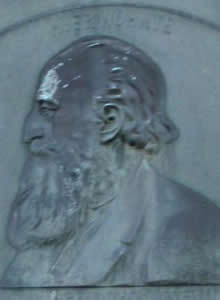
Ludwig Anzengruber (29 november 1839 – 10 december 1889)
Gedenksteen in Wenen (detail)
De Franse schrijver Maurice Genevoix werd geboren op 29 november 1890 in Decize (Nièvre). Zie ook alle tags voor Maurice Genevoix op dit blog en ook mijn blog van 29 november 2009.
Uit: Au seuil des guitounes
« Les Allemands sont tout proches. Des soldats français, mutilés, terrorisés, se replient dans le désordre. Le lieutenant Genevoix tente de rassembler ses hommes pour donner l’assaut.
Ligne de sections par quatre, sous bois, gravissant la pente. Je réagis mal contre l’inquiétude que m’inspire la nervosité des soldats. J’ai confiance en eux, en moi; mais je redoute, malgré que j’en aie, quelque chose d’impossible à prévoir, l’affolement, la panique, est-ce que je sais?
Comme nous montons lentement! Mes artères battent, ma tête s’échauffe.
Ah! …
Violente, claquante, frénétique, la fusillade a jailli vers nous comme nous arrivions au sommet. Les hommes, d’un seul mouvement impulsif, se sont jetés à terre.
«Debout, nom d’un chien! Regnard, Lauche, tous les gradés, vous n’avez pas honte? Faites-les lever!»
Nous ne sommes pas encore au feu meurtrier. Quelques balles seulement viennent nous chercher, et coupent des branches au-dessus de nous. Je dis, très haut:
«C’est bien compris? Je veux que les gradés tiennent la main à ce que personne ne perde la ligne. Nous allons peut-être entrer au taillis, où l’on s’égare facilement. Il faut avoir l’oeil partout.»
Là-bas, dans le layon que nous suivons, deux hommes ont surgi. Ils viennent vers nous, très vite, à une allure de fuite. Et petit à petit je discerne leur face ensanglantée, que nul pansement ne cache et qu’ils vont montrer aux miens. Ils approchent; les voici; et le premier crie vers nous:
«Rangez-vous! Y en a d’autres qui viennent derrière!»
Il n’a plus de nez. A la place, un trou qui saigne, qui saigne…”
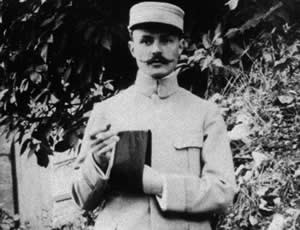
Maurice Genevoix (29 november 1890 – 8 september 1980)
Tijdens WO I
De Litouwse dichter en schrijver Antanas Škėma werd op 29 november 1910 geboren in Lodz in Polen. Zie ook alle tags voor Antanas Škėma op dit blog en ook mijn blog van 29 november 2009 en ook mijn blog van 29 november 2010.
Uit: Steps And Stairs (Vertaald door Kęstutis Girnius)
« Advertisements for soap, candy, suits, and savings accounts would light up atop skyscrapers. Among the skyscrapers swayed an amorphous mist, like a fisherman’s net from the shores of the Mius. Like the tiny epicurean dogs of spinsters, the goldfish in the aquariums of restaurants and movie theaters swam proudly and lazily through the green paths of the glassy water, inviting the hungry and the dumb into the heaven of mechanized food and visions.
The several dozen steps to the bank would return the Ukrainian into a blue past, into clear air which, like a splattered mirror, glowed in a frame of acacias swooning from thirst, into the death throes of great fish with rolled eyes, into breaking reeds, into the death struggle of mighty and white tails in the mud of the riverbank. Into the single ecstasy of his youth, an early morning when taut muscles, wet clothes, and the breathing of a distant God intertwined with life’s syncopated rhythm, and the gigantic explosion of flying forms and very real happiness. Several dozen steps to the future, a million steps to a lost past. The Ukrainian was born on the shores of the fertile Mius River. Eighty versts from Taganrog, the port on the Azov Sea.
One night he was washing lampshades on 105th Street. Seven shades, like seven upturned Chinese hats, swayed below his dirty hands. He stood on an extension ladder. One leg leaned against a stair step, the other against accounting books. He had borrowed the books from a bookshelf, for the seventh shade hung above the steps leading to the room with the safe. This shade was particularly dusty, and the Ukrainian was cleaning the top of it with a damp rag. The boundaries between the dirt and the enamel arranged themselves like scythe-paths in a wheat field. It was a clever deception. The light from the neighboring lamp covered the last hat with a golden hue, and the little round world shrunk like in a Medieval etching. The Ukrainian stuck out his head, like that monk who found the horizon and surveyed the turning of the spokes and wheels of the universe. However, he only saw a field of wheat.”
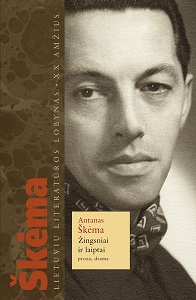
Antanas Škėma (29 november 1910 – 11 augustus 1961)
Cover
De Amerikaanse schrijfster Madeleine L’Engle werd geboren in New York op 29 november 1918. Zie ook alle tags voor Madeleine L’Engle op dit blog en ook mijn blog van 29 november 2009 en ook mijn blog van 29 november 2010.
Uit: A Wrinkle In TIme
“It was true that Charles Wallace seldom spoke when anybody was around, so that many people thought he’d never learned to talk. And it was true that he hadn’t talked at all until he was almost four. Meg would turn white with fury when people looked at him and clucked, shaking their heads sadly.
“Don’t worry about Charles Wallace, Meg,” her father had once told her. Meg remembered it very clearly because it was shortly before he went away. “There’s nothing the matter with his mind. He just does things in his own way and in his own time.”
“I don’t want him to grow up to be dumb like me,” Meg had said.
“Oh, my darling, you’re not dumb,” her father answered. “You’re like Charles Wallace. Your development has to go at its own pace. It just doesn’t happen to be the usual pace.”
“How do you know?” Meg had demanded. “How do you know I’m not dumb? Isn’t it just because you love me?”
“I love you, but that’s not what tells me. Mother and I’ve given you a number of tests, you know.”
Yes, that was true. Meg had realized that some of the “games” her parents played with her were tests of some kind, and that there had been more for her and Charles Wallace than for the twins. “IQ tests, you mean?”
“Yes, some of them.”
“Is my IQ okay?”
“More than okay.”
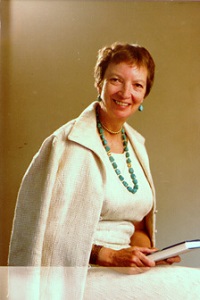
Madeleine L’Engle (29 november 1918 – 6 september 2007)
De Cubaanse dichter en singer-songwriter Silvio Rodríguez Domínguez werd geboren in San Antonio de Los Baños op 29 november 1946. Zie ook alle tags voor Silvio Rodriguez op dit blog en ook mijn blog van 29 november 2009.
In search of a dream
In search of a dream
This young man comes closer
Whole generations go on
In search of a dream
In search of a beautiful
And rebellious dream
In search of a dream
That wins and that loses
In search of a dream
Made of beautiful madness
In search of a dream
That can kill and can heal
In search of a dream,
Cyclones come undone
How many illusions there are
In search of a dream?
In search of a dream
The rives flow
In search of a dream
People jump into emptiness
In search of a dream
A lover embraces
In search of a dream
The trickster feigns
In search of a dream
The stones were sculpted
In search of a dream
God came to earth
In search of a dream
I started my day
In search of a dream
That has yet to be.

Silvio Rodríguez (San Antonio de Los Baños, 29 november 1946)
De Chileens-Venezolaanse dichter, wetgever, filosoof, politicus, diplomaat, wetenschapper, humanist en taalkundige Andrés Bello werd geboren in Caracas, Venezuela, op 29 november 1781. Zie ook alle tags voor Andrés Bello op dit blog en ook mijn blog van 29 november 2009.
Allocution to Poetry (Fragment)
Will you too go there with the courtesan crowd
to oflfer the foolish incense of servile flattery?
You were not thus in your most beauteous days,
when in the infancy of humankind,
teacher of peoples and of kings,
you sang its first laws to the world.
Oh goddess, do not stay
in that region of wretchedness and light,
where your ambitious rival, Philosophy,
subjecting virtue to calculation,
stripped you of mortals’ worship,
where the crowned hydra mena’ces,
bringing anew to enslaved thought
the old night of savagery and crime;
where freedom is called vain delirium,
faith servility, and pomp greatness,
and corruption bears the name of culture.
Take from the rotted oak your golden lyre
with which you sweetly sang to spellbound men
of meadows and flowers, of the whisper
of the dark forest, the tranquil murmur
of the transparent stream,
and innocent Nature’s fresh allure.
Spreading your diaphanous wings,
over the vast Atlantic go,
to other heavens, other folk, another world,
where earth still wears its ancient dress,
and man has scarcely conquered it;
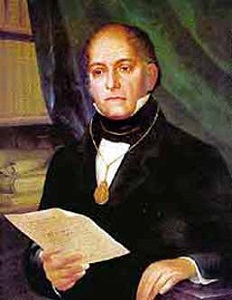
Andrés Bello (29 november 1781 – 10 oktober 1865)
